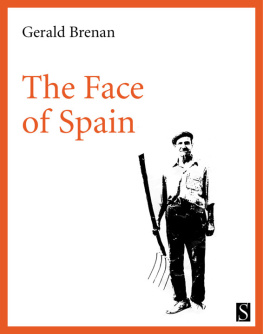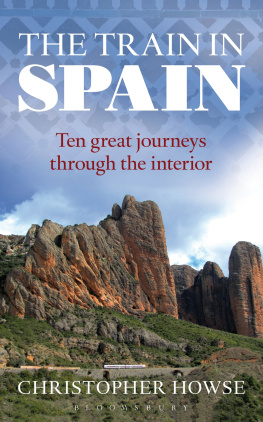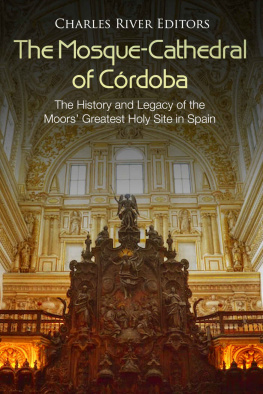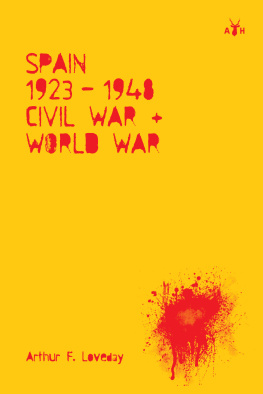Brenan Gerald - The Face of Spain
Here you can read online Brenan Gerald - The Face of Spain full text of the book (entire story) in english for free. Download pdf and epub, get meaning, cover and reviews about this ebook. City: London, year: 2012, publisher: Serif Books, genre: Detective and thriller. Description of the work, (preface) as well as reviews are available. Best literature library LitArk.com created for fans of good reading and offers a wide selection of genres:
Romance novel
Science fiction
Adventure
Detective
Science
History
Home and family
Prose
Art
Politics
Computer
Non-fiction
Religion
Business
Children
Humor
Choose a favorite category and find really read worthwhile books. Enjoy immersion in the world of imagination, feel the emotions of the characters or learn something new for yourself, make an fascinating discovery.
- Book:The Face of Spain
- Author:
- Publisher:Serif Books
- Genre:
- Year:2012
- City:London
- Rating:4 / 5
- Favourites:Add to favourites
- Your mark:
- 80
- 1
- 2
- 3
- 4
- 5
The Face of Spain: summary, description and annotation
We offer to read an annotation, description, summary or preface (depends on what the author of the book "The Face of Spain" wrote himself). If you haven't found the necessary information about the book — write in the comments, we will try to find it.
The Face of Spain — read online for free the complete book (whole text) full work
Below is the text of the book, divided by pages. System saving the place of the last page read, allows you to conveniently read the book "The Face of Spain" online for free, without having to search again every time where you left off. Put a bookmark, and you can go to the page where you finished reading at any time.
Font size:
Interval:
Bookmark:
Fascinating
New Statesman
The ideal travel book miraculous
The Observer
A brilliant interpreter of Spain to the rest of the world
The Times
Knowledge, discernment and a most vivid pen compelling
Times Literary Supplement
A book of great balance and beauty most illuminating
Rose Macaulay, Spectator
Britain s greatest Hispanist travels through Francos bleak Spain . His account is unforgettable.
Ian Gibson
Travel writing at its best a descriptive writer of great gifts
The Age ( Melbourne )
GERALD BRENAN, who was born in 1894, set off on foot at the age of sixteen for the Pamir Mountains in Central Asia, but was forced to abandon the trip in Bosnia, defeated by snow and a lack of funds; he had walked more than 1,500 miles. Joining the army in 1914, he fought at the Somme and Passchendale, was twice wounded and awarded both the Military Cross and the Croix de Guerre.
In 1919 he moved to a remote village in the Sierra Nevada where he lived intermittently until 1934, an experience he later described in South from Granada. In the early 1920s he had a love affair with the painter Dora Carrington and in 1931 married the American poet Gamel Woolsey, with whom he lived near Mlaga. During the Second World War he served in the Home Guard and as an Air Raid Warden; he also broadcast to Spain for the BBC and in 1943 published The Spanish Labyrinth, his classic study of the origins of the civil war, which has been continuously in print ever since.
He and Gamel first revisited Spain in 1949 the journey described in The Face ofSpain and returned to live there permanently in 1953. A regular contributor to the New Statesman and New York Review of Books, his many books include The Literature of the Spanish People, St John of the Cross: His Life and Poetry, Thoughts in a Dry Season and two volumes of autobiography, A Life of Ones Own and Personal Record. He died in 1987, unrivalled as the most eminent English-language writer on Spanish history and culture.
The Face of Spain
Gerald Brenan
Serif
London
This edition first published 2010 by
Serif
47 Strahan Road
London E3 5DA
www.serifbooks.co.uk
Originally published in 1950 by the Turnstile Press
Copyright Gerald Brenan, 1950
Afterword Michael Jacobs, 2010
This edition copyright Serif, 2006, 2010
E-book edition copyright Serif, 2012
All rights reserved. No part of this publication may be reproduced, transmitted or stored in a retrieval system, in any form or by any means, without prior permission in writing from the publishers.
ISBN:978 1 90915 011 9
British Library Cataloguing in Publication Data.
A catalogue record for this book is available from the British Library.
Library of Congress Cataloging in Publication Data.
A catalog record for this book is available from the Library of Congress.
E-book produced by Keywords Associates Ltd
Cover design by Pentagram
Contents
To Gamel
THIS BOOK IS AN ACCOUNT of a journey which my wife and I made in the centre and south of Spain . The ground we covered was not entirely new to either of us. In my youth I had spent some six or seven years in Andalusia . When I married we bought a house near Mlaga and from it we watched the confusion and horror of the opening phases of the civil war. Then, on our return to England , my wife wrote an account of our experiences, while I produced two large books one on Spanish history and politics and the other (now in the press) on Spanish literature. But thirteen years is a long time enough to make one wonder if one knows or remembers anything and when we returned last year my mind was full of questions. What was Spain really like? What was the character of Spanish culture and civilisation? How did it compare with the French and the English? To answer these questions I decided to keep a diary in which I would record every day my experiences and impressions. I did so, and it is out of this diary that the present book has been made.
But Franco Spain , it will be said, has a special interest. We have been calling it names in Parliament and in the press for many years, but few English people have any idea what it feels like to live in it. To throw some light on that might be valuable. However it was by no means part of my original plan to do this. I was tired of politics especially of the hopeless politics of the peninsula and wished to give my attention to the more permanent and characteristic features of the country. Regimes, I said to myself, come and go, but what is really important in Spain never changes. It was with a certain dismay therefore that I was to find that such an attitude was impossible.
For this is what happened: from the moment of our arrival in Spain to the moment of our leaving it we were besieged by people who wished to talk to us about the political situation. Never have I been in a country whose citizens were so anxious to express their views on their government. And since many of those conversations got into my diary, I have passed on a selection of them to the reader a sufficient number, I think, to give him a fair idea of how ordinary Spaniards feel and think at the present time.
The picture that emerges is a depressing one. Spaniards of all classes and of all political ideologies are discouraged and exasperated. Those who let their fanaticism get the better of them during the civil war are often obsessed by feelings of guilt, for no hangover is worse than that which follows a civil war and a reign of terror. The widespread corruption causes shame and dismay, the system of government controls is the despair of businessmen, while the severe inflation has reduced the middle and lower middle classes to great straits and the agricultural labourers to starvation. The feeling given out by Spain today is that of a country whose road to I do not say prosperity but simply to any humanly tolerable conditions is blocked. This raises a question for me. In the course of this book I have described what I have seen and reported what was said to me, but have made little comment. Am I to leave the matter there, or are some general remarks of a political sort called for? I fear that they are, and yet I am in some doubt how to put them. Let me all the same make the attempt.
The Franco regime a few years ago was a harsh and oppressive dictatorship of a Fascist kind. But its dominating clique, the Falange, had an idealism which in its own way was perfectly genuine. The bulk of its supporters belonged to the middle class, and it aimed at raising the level both of that class and of the working classes as a necessary step in the realisation of its more ambitious aims. But, opposed by the passive forces of the Church and of the landowners, as well as by the more or less liberal professional class and the businessmen and, it must be added, betrayed by its own leaders it was never in a position to carry through any of the measures which might in the end have given it a working-class following. Then came the shock of Hitlers defeat, the irresistible growth of the black market and the postwar inflation. Cynicism spread rapidly through the party and most of the higher ranks, who had been greatly diluted by place hunters during the war, allowed themselves to be corrupted by the rewards which participation in the black market offered. Today the Falange is a body of men who cling to power because they fear to lose their jobs, but who are ashamed of themselves. Their shame, and the Allied victory, have made the regime much milder.
The inflation, the lack of foreign exchange and the black market are the causes of three-quarters of the terrible poverty and misery one sees in Spain today. Everyone blames the regime for them, though in fact such blame is only partly justified. These things are to a great extent the result of Spain s political isolation, of two years of drought and of the civil war. The only cure lies in a substantial injection of Marshall Aid. Without that no government, however admirable, could restore the worn-down Spanish economy or break the black market. But how give money to a regime of this sort? Apart from the undesirability of propping up General Francos dictatorship and the serious effect that this would have on world opinion, there is the question whether such aid would be of any use in restoring the country. A British observer, by no means on the Left, with whom I discussed this was of the opinion that foreign loans would be as wasted on the present Spanish government as they have been on that of Chiang Kai-shek. But surely, it will be said, conditions could be imposed which would make it certain that the aid provided would go where it was needed? Apparently the Americans have already offered small loans on such conditions, and they have been refused.
Font size:
Interval:
Bookmark:
Similar books «The Face of Spain»
Look at similar books to The Face of Spain. We have selected literature similar in name and meaning in the hope of providing readers with more options to find new, interesting, not yet read works.
Discussion, reviews of the book The Face of Spain and just readers' own opinions. Leave your comments, write what you think about the work, its meaning or the main characters. Specify what exactly you liked and what you didn't like, and why you think so.







